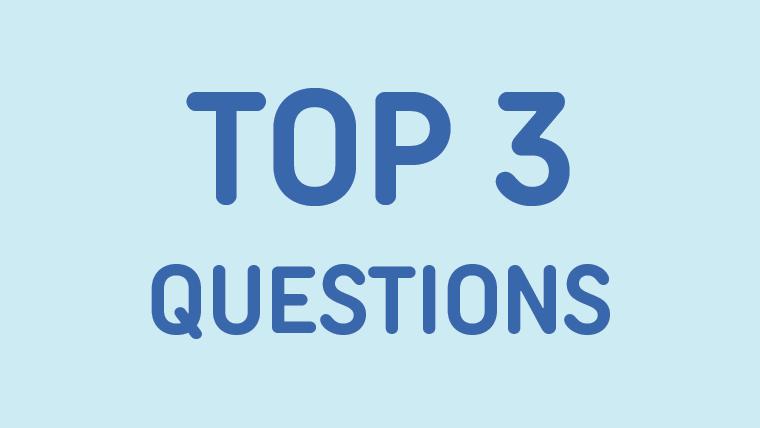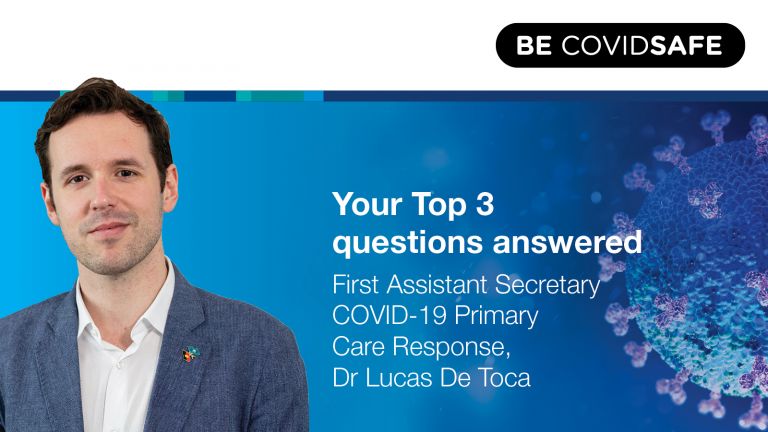
Good morning. I am Doctor Lucas De Toca, and I lead the Department of Health's primary-care response into COVID-19. Welcome to top three. I'm joined today by Linda who will be doing the Auslan interpreting. There is a mandate to wear masks when inside in the Australian Capital Territory. That mandate excludes workplaces where people frequently work together. Since Linda and I frequently work together, we can take our masks off for this segment but keep appropriate distance. We are on the land of the Ngunnawal people. Dhawra nhuna, dhawra Ngunawal. Yanggu gulanyin ngalawiri, dhunayi, Ngunawal dhawra. Wanggarralijinyin mariny balan bugarabang, and I also extend that acknowledgement to the traditional owners of the lands where people may be watching from across the continent. My shout out today goes to everyone who is getting vaccinated. Vaccination rates are really going up and we want to thank you for those efforts. I particularly want to thank you, the healthcare workers, in all the vaccine clinics, that are working incredibly hard to make sure that you have access to your vaccines, particularly our hero receptionists in general practices, Aboriginal community control health services, and all the state and territory clinics that offering vaccines to people. Please be patient. There's changes and more vaccines becoming available and we are really encouraged to see that there is a high demand and people are really keen to get their vaccine, but if there is no appointment available, if the clinic has not caught up with the latest changes or if they can't fulfil your need immediately, please be patient and just realise that the person on the other line, the other end of the line, is just as concerned about Covid as you are, but thank you very much.
First question. Why is it now mandatory for aged care workers to receive a COVID-19 vaccine?
Aged care workers have an absolutely critical front-line role in supporting the people who are the most vulnerable for COVID-19. Evidence from Australia, with the first wave, the Victorian resurgence and other outbreaks, as well as significant evidence from overseas, shows that residents in residential aged care facilities are, by far, the people most at risk of severe disease, hospitalisation and death from COVID-19. We have very high rates of vaccination with two doses among residents in the aged care facilities. Nearly all, an overwhelming majority, of people who live in aged care facilities have received two doses of the vaccine already. And now, we need to move to ensure that there is a second layer of protection, through the workers, so that the people who are in the most contact, or most frequent contact, with residents of aged care facilities are also protected. From mid-September, all aged care workers must have at least one dose of a COVID-19 vaccine. To support that, the government has launched a Grants program that will allow aged care facilities to support workers to go off site to get their vaccination. It is really important that we all do our part, people are coming forward to get tested and the National Cabinet just wants to ensure that our most vulnerable friends and family, residents of aged care facilities, are protected, and aged care workers are a crucial part of ensuring that protection.
Second question. Will COVID-19 symptoms be different if I have been vaccinated?
As you know, both COVID-19 vaccines currently available in Australia are incredibly good at protecting you from severe disease, hospitalisation, and death, they are really good protection against severe disease. If someone is unlucky to get Covid after having been vaccinated and you can still, in some cases, get Covid after you get vaccinated, even though your chances seem to be lower, it is likely you will experience a much milder disease. There is a study in the UK where people were asked to monitor the symptoms using an app and compared the symptoms of people who had received the vaccine versus people who hadn't, showed there were some changes in the symptoms that people experienced if they had Covid after being vaccinated compared to people who had Covid without having been vaccinated. Of course, unvaccinated people had an overwhelmingly higher chance of severe disease and bad outcomes from Covid, but even in the milder side of the spectrum, their symptoms seemed to be different. Vaccinated people seem to be 70% less likely to have a fever compared to unvaccinated people. They seem to be 55% less likely to experience fatigue, and they also appear to be 50% less likely to experience chills, headaches and loss of smell, anosmia, strange but very characteristic symptom that some people experience with Covid. However, vaccinated individuals with Covid that were experiencing mild disease, were just as likely to experience some of the mild shortness of breath and the swollen glands that people with mild disease and Covid tend to experience. They were also 24% more likely to experience sneezing which is interesting given that sneezing is not a symptom generally associated with Covid but it seems to be a little bit more prominent in people who experience mild disease from COVID-19 after getting vaccinated. The important message, though, and these are early findings, is that vaccinated people had an overwhelmingly lower chance of having severe disease, they had a lower chance of being infected altogether, and even if they got infected, their disease is quite mild.
And finally, now that anyone over the age of 18 years can request AstraZeneca, can we mix vaccines? For example, if I had one dose of the Pfizer vaccine, can my second dose be AstraZeneca?
The Australian Technical Advisory Group on Immunisation, or ATAGI, which is the group that provides advice to government and to health professionals on vaccines in Australia, guides our vaccination program for COVID-19, of course. At the moment, the ATAGI advice and the advice from the Therapeutic Goods Administration, the regulator for medicines in Australia, is that a full course of Covid vaccination is two doses of the same vaccine, two doses of Pfizer vaccine or two doses of AstraZeneca. There is emerging data, emerging evidence overseas of different studies that are looking at what scientists would call heterologous prime-boost regimes, or mixes of two different vaccines, and the preliminary data shows that there might be some benefit and there might be some potential for these regimes to be used in the future, however this is very early at the moment, we're talking about small studies that are looking at efficacy from laboratory results and from immune reactions, not clinical efficacy or effectiveness in the real world. At this stage, the advice from our experts is that a full course is two of the same vaccine. This may change in the future as more evidence becomes available and our program continues to be guided by expert medical advice. There are a limited number of circumstances where a mixed dose regime might be appropriate right now in the Australian context and that is if someone has had a first dose of a vaccine and has experienced a severe adverse event, an allergic reaction like anaphylaxis, or something that means they can't receive the second dose. If you have had your first dose of vaccine and you have experienced anaphylaxis, a very severe allergic reaction, allergic reaction, or a very severe side effect from the vaccine, it might be appropriate for you to get a second dose of a different vaccine. In that case, please talk to your GP or other health professional or your regular specialist and have a conversation about what that means for you. You can also contact a specialist immunisation service and there is a website that has a list of all the services. You can go online and check the National Centre for Immunisation Research and Surveillance on www.NCIRS.org.au and you will have information on specialised immunisation services there. That is all for today. Thank you so much for watching. Thank you, Linda, for your interpreting, and have a COVIDSafe rest of the day.
Top 3 questions
- Why is it now mandatory for aged care workers to receive a COVID-19 vaccine?
- Will COVID-19 symptoms present differently if I have been vaccinated?
- Now that anyone over the age of 18 years can request AstraZeneca, can we mix vaccines? For example: If I have had one dose of the Pfizer vaccine, can my second dose be AstraZeneca?







